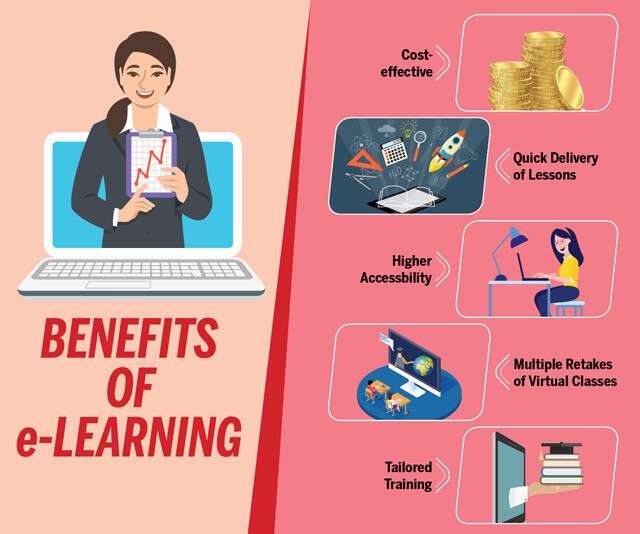The Benefits of E-Learning
E-learning has revolutionized the way we acquire knowledge and skills. In this article, we will explore the numerous benefits of e-learning and how it can positively impact individuals and organizations.
Flexibility and Convenience
One of the key advantages of e-learning is its flexibility and convenience. With e-learning, individuals can access educational materials and courses from anywhere, at any time. This eliminates the need for physical attendance in a traditional classroom setting, allowing learners to study at their own pace and fit their education around their busy schedules.
Cost-Effectiveness
E-learning offers a cost-effective solution for both learners and organizations. Traditional education often involves expenses such as transportation, accommodation, and course materials. E-learning eliminates these costs, making education more accessible and affordable. Additionally, organizations can save on training expenses by implementing e-learning programs, reducing the need for in-person trainers and printed materials.
Wide Range of Courses and Resources
When it comes to e-learning, the possibilities are endless. There is a vast array of courses available online, covering various subjects and industries. Learners have the freedom to choose the courses that align with their interests and career goals. Moreover, e-learning platforms often provide additional resources such as videos, interactive quizzes, and forums, enhancing the learning experience.
Personalized Learning Experience
E-learning allows for a personalized learning experience. Learners can progress through the material at their own pace, focusing on areas that require more attention while skipping over content they already understand. This level of customization ensures that learners get the most out of their educational journey, resulting in improved knowledge retention and skill development.
Improved Engagement and Interaction
Contrary to popular belief, e-learning can foster high levels of engagement and interaction. Online platforms often incorporate interactive elements such as multimedia presentations, discussion boards, and virtual simulations. These features encourage learners to actively participate in their education, collaborate with peers, and apply their knowledge in practical scenarios.
Global Accessibility
E-learning breaks down geographical barriers, making education accessible to individuals around the world. This global accessibility opens up opportunities for international collaboration and networking. Learners can connect with experts and fellow learners from different countries, gaining diverse perspectives and expanding their professional networks.
Continuous Learning and Skill Development
E-learning promotes continuous learning and skill development. With rapidly evolving industries and technologies, it is crucial to stay updated with the latest knowledge and skills. E-learning allows learners to easily access new courses and materials, ensuring that they can continuously enhance their expertise and adapt to changing industry demands.

E-learning offers numerous benefits, including flexibility, cost-effectiveness, a wide range of courses, personalized learning experiences, improved engagement, global accessibility, and continuous learning opportunities. By embracing e-learning, individuals and organizations can unlock a wealth of knowledge and skills, empowering them to thrive in the digital age.
Frequently Asked Questions about the Benefits of e-Learning
1. What is e-Learning?
E-learning refers to the use of electronic technologies, such as computers and the Internet, to deliver educational content and training materials.
2. What are the advantages of e-Learning?
e-Learning offers flexibility in terms of time and location, personalized learning experiences, cost-effectiveness, and the ability to track progress and performance.
3. How does e-learning promote self-paced learning?
e-Learning allows learners to access educational materials at their own pace, enabling them to review and revisit content as needed, enhancing their understanding and retention of the material.
4. Can e-learning be accessed from any location?
Yes, one of the major benefits of e-learning is that it can be accessed from anywhere with an internet connection, providing learners with the freedom to study from home, work, or any other location.
5. Is e-learning suitable for all types of learners?
Yes, e-learning can be adapted to accommodate various learning styles and preferences, making it suitable for visual, auditory, and kinesthetic learners alike.
6. How does e-Learning save costs?
e-Learning eliminates the need for travel, printed materials, and physical classroom space, resulting in significant cost savings for both learners and educational institutions.
7. Can e-learning provide personalized learning experiences?
Yes, e-learning platforms often offer personalized learning paths and adaptive assessments, tailoring the content and pace to individual learners’ needs and abilities.
8. What are the benefits of e-learning for organizations?
e-Learning allows organizations to provide consistent training across geographically dispersed teams, track employee progress, and easily update content to keep up with changing industry trends.
9. How does e-learning enhance knowledge retention?
e-Learning incorporates multimedia elements, interactive quizzes, and gamification techniques, which have been shown to improve knowledge retention and engagement compared to traditional classroom settings.
10. Can e-learning support lifelong learning?
Absolutely! E-learning provides individuals with the opportunity to continuously update their skills and knowledge, allowing them to stay relevant in a rapidly evolving job market.




